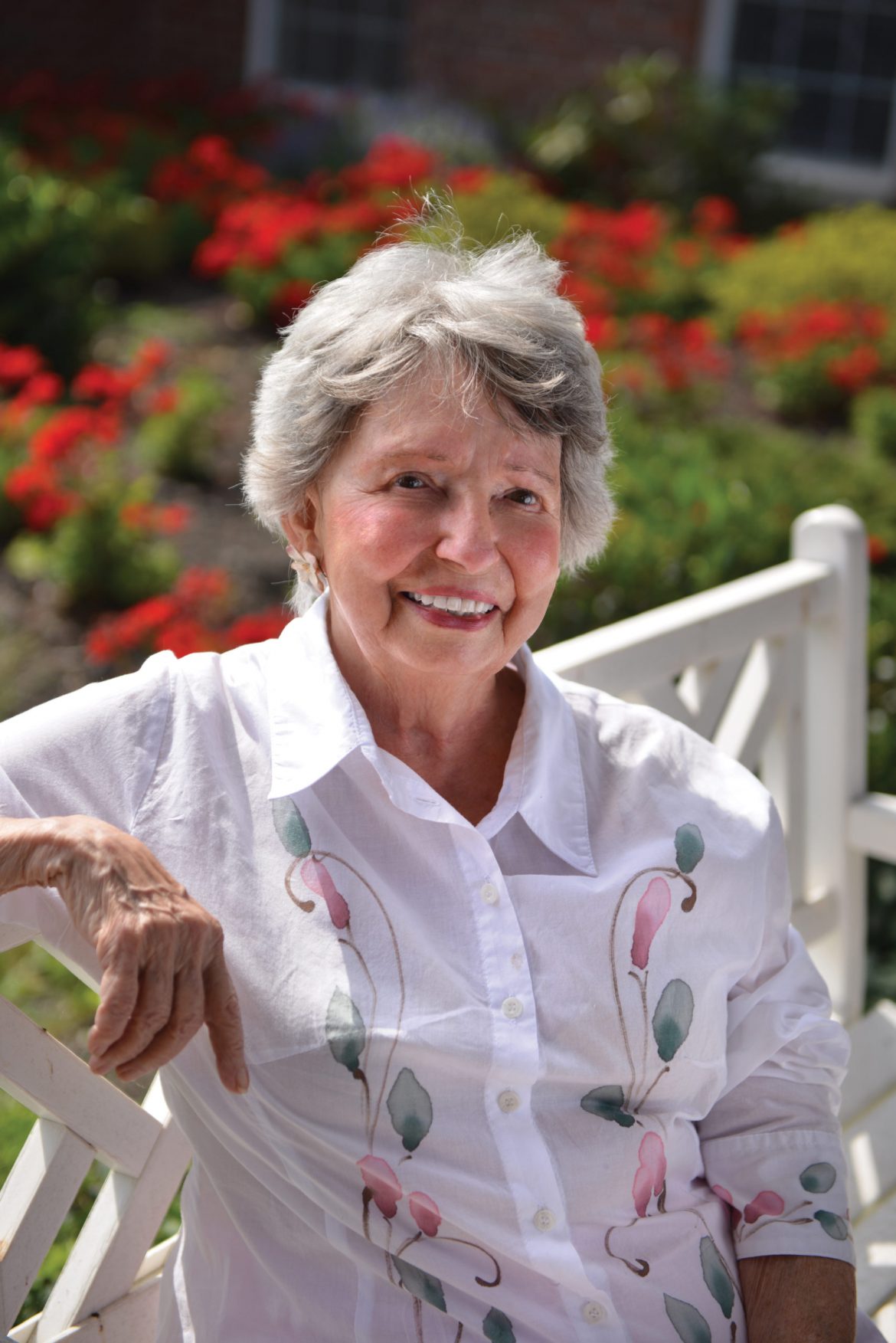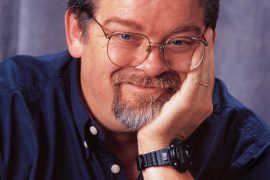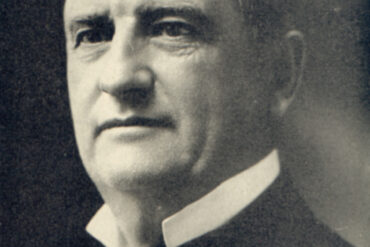You may not know the name Laura Darby, but you should. Hospice of Huntington, Ebenezer Medical Outreach, DARCO International and Lily’s Place all owe a debt of gratitude to her vision, determination and ingenuity.
By James E. Casto
HQ 92 | WINTER 2016
As a high school student, Laura Darby dreamed of becoming a nurse. It took her years of waiting, but she finally would reach that long-dreamed-of goal.
She then would go on to achieve more – much more – in a remarkable career that’s been filled with efforts to provide health services to those in need. She founded Hospice of Huntington in 1982, served for more than 20 years at Ebenezer Medical Outreach Center and recently provided a desperately needed helping hand for Lily’s Place.

Along the way, she worked side by side with her late husband, Dr. H. Darrel Darby, as he established his foot care practice and later founded a surgical shoe business that’s now a global medical company.
Born Laura Grace Boggs on July 17, 1928, just outside Rainelle in West Virginia’s Greenbrier County, she grew up with three brothers and two sisters.
“My oldest sister, Gladys, who lives in Baltimore, is 95 – and just got married,” she says.
The spark that ignited her interest in nursing came when she was in high school.
“My best friend was sick and I was at her house taking care of her,” she says. “When her sister came in, she saw what I was doing and said to me, ‘You should be a nurse.’ That planted the seed. I even filled out all the papers for admission to nursing school and was accepted. But my family had no money to pay for that and so the dream was postponed – but not forgotten. It would be 31 years later when I enrolled in nursing school.”
She met her future husband in 1947, just after he was discharged from his military service in the U.S. Coast Guard, and they married the following year. They had six children – Michael, Ann, Beth, Sandra, H. Darrel II and Linette. Today, she has 17 grandchildren and four great-grandchildren.
Dr. Darby, who achieved international prominence in the podiatry profession, died in 2003.
In a 1994 newspaper interview, Dr. Darby explained what delayed his wife’s entry into nursing training: “With six children in the early years, she didn’t have much time to do things outside the house, other than things involving the children.”
When her young children reached high school, she enrolled at Marshall University’s School of Nursing, first earning an associate degree, then a bachelor’s. She earned her bachelor’s degree the same year her youngest daughter earned her high school diploma.
While working on her bachelor’s degree, Darby heard about hospice, a program to help care for terminally ill patients in their homes and let them die with as much comfort and dignity as possible. There had been talk of establishing a hospice program in Huntington but that talk had never been translated into action. Darby adopted the program as her senior project and set about making it happen.

“Without realizing how difficult it would be, she just did it,” Dr. Darby said in 1994.
“Sharon Ambrose was my adviser at Marshall,” Darby says. “When I told her what I wanted to do, she approved the project, although she later confessed she was sure there was no way I could do that in a semester. But she never discouraged me.”
Darby drew up a plan that started with assembling a board of directors. She went to see Dr. Will Neal, director of the Cabell-Huntington Health Department, and asked him for a desk and a phone … and if he would be willing to serve on the board of the organization she envisioned. He agreed to all three of her requests. Then she and Sharon Ambrose went to see Dr. David Daniels and asked him if he would support the new venture and serve on its board. He agreed (and much later became the organization’s medical director). From there she went to Cabell Huntington Hospital, St. Mary’s and Huntington Hospital (now River Park Hospital) and successfully enlisted their support.

Looking back, Darby says she was inspired by a simple Scripture passage: “Ask and you shall receive. Knock and the door will be opened.”
“We obtained the free use of a former guest room at the old Hotel Prichard that we used as a makeshift office,” she says. “We were glad to have it but space was so tight we had to store our supplies on shelves over the bathtub.”
In 1983, Hospice hired its first paid employee, Charlene Farrell, who took the helm as director, a post she would have until she retired in 2014.
“Charlene was exactly what Hospice needed to grow and expand its services,” says Darby. “What a whale of a job she did!”
Under Farrell’s leadership, Hospice moved from its crowded hotel room to the third floor of the parish house at Trinity Episcopal Church, then to a downtown building on Sixth Avenue, where the organization still has its offices and operates a gift shop. In 2006, Hospice built the state-of-the-art Emogene Dolin Jones Hospice House on Staunton Road in East Huntington.
Today, more than 30 years after it was founded, Hospice has a $12 million budget, 140 employees and a corps of 300 volunteers, who over the years have provided end-of-life care for more than 15,000 patients. In 1983, Hospice cared for 17 patients. It now serves 1,000 patients each year.
“Hospice of Huntington attributes its existence today to its founder – Laura Darby,” says current Hospice President and CEO Melanie Hall. “Hospice continues to carry on the mission exemplified by Laura. The people of Huntington are grateful recipients of her dedication. She has put ‘feet on her prayers’ and put her faith into action.”
Hospice is dedicated to making sure people who need its services are served regardless of their ability to pay. Medicare, Medicaid and most insurance plans pay for hospice services.
“Laura inspires us to serve others,” notes former Hospice Executive Director Charlene Farrell. “Sometimes the task set before us seems daunting with all its complexities and difficulties. Laura walks in faith to humbly meet the needs of the most vulnerable among us, confident that God will open the doors necessary to get the job done.”
Once Hospice was firmly established, Darby moved on to become a nurse practitioner at Ebenezer Medical Outreach Center and an associate clinical professor at the Marshall School of Nursing.
Her face was a familiar one at Ebenezer from 1991 until her retirement in 2012. Early on she functioned as the clinic’s volunteer administrator. The clinic was originally established in 1986 by Ebenezer United Methodist Church as a missionary outpost. In 2003, it moved to Douglass Centre, the former all-black Douglass High School on 10th Avenue. There, it offers a wide range of free health care services to those in need.
In the earliest years of Dr. Darby’s podiatry practice, his wife kept the books and filled in at his office when needed. Later, when the doctor designed a new surgical shoe and founded a company to manufacture it, she again found herself keeping books, this time for her husband’s new firm.

Now celebrating its 30th anniversary, DARCO International, still headquartered in Huntington, is a leading provider of post-op, trauma and wound care products for foot and ankle patients worldwide. Michael Darby is the company’s chairman, and H. Darrel Darby II is president and CEO.
With drug abuse at epidemic levels in the Huntington area, there’s been a tremendous increase in the number of babies born addicted to drugs because their mothers were drug users. When a group of concerned citizens began planning Lily’s Place, a transitional care center for addicted infants, they feared they might have a difficult time locating a suitable building for the care center.
But their search came to a quick end when Darby and the Darby Family Limited Partnership donated an office building at 1320 Seventh Ave. to Lily’s Place. The building previously housed Dr. Darby’s practice.
“Few people in Huntington know the full impact Laura Darby has had on our community,” says Mary Brown, co-founder of Lily’s Place. “From Hospice to Ebenezer Medical Outreach to Lily’s Place, Laura has had her loving hand in it all. She very kindly took me under her wing and breathed her wisdom into my efforts at Lily’s Place. She gave us more than a building – she was our biggest cheerleader along the way, offering support and guidance and often just a sympathetic ear.”

For all of her efforts to improve the quality of life in the Huntington region, Darby has been the recipient of numerous honors.
In 1996, she was named “Citizen of the Year” by the editors of The Herald-Dispatch.

In 2003, Marshall University recognized her efforts on behalf of the community’s health needs by awarding her an honorary doctorate.
In 2014, The Heritage Museum, housing Heritage Farm Museum and Village’s oldest collections, was dedicated to Laura Darby and her late husband, Dr. H. Darrel Darby, for their years of support.
“Laura Darby is a true pioneer with a brilliant mind and a compassionate heart,” says Audy Perry, executive director of the Heritage Farm Foundation. “She has used both to make our community a stronger, more caring place to live. I shudder to think of where Huntington would be without the influence, drive and foresight of her work.”
Those who know Laura Darby are quick to praise her for her determined efforts to assist members of the community in need of medical help. But perhaps her late husband said it best: “She doesn’t see impossible things. She just sees things that take a little more ingenuity to get done.”





